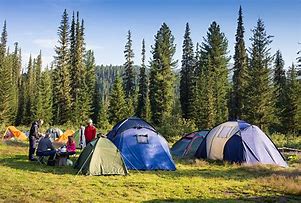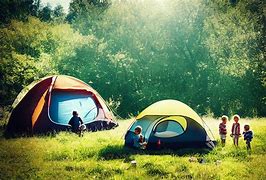 7 Common Camping Mistakes Beginners Make — And How to Avoid Them
7 Common Camping Mistakes Beginners Make — And How to Avoid Them
By Jeffrey | May 2025
Thank you for reading this post, don't forget to subscribe!Whether you’re setting off on your very first camping trip or returning to the outdoors after years away, it’s easy to overlook the little things that can turn a peaceful weekend in nature into a stressful scramble.
In this guide, we’ll break down seven common mistakes beginners make while camping, and more importantly, how you can avoid them. From gear oversights to campsite etiquette, these tips will help you head into the wild with confidence.
1. Underestimating the Weather
Why it’s a mistake:
Nature doesn’t follow your vacation calendar. Many new campers assume that summer camping means sunny skies and warm nights — only to find themselves caught in an unexpected storm, strong winds, or even chilly mountain temperatures.
How to avoid it:
- Check the forecast for your exact location before you go — not just the nearest city.
- Pack in layers: Bring a waterproof jacket, thermal base layers, and a warm hat even in summer.
- Waterproof your gear: Make sure your tent has a rainfly, and bring garbage bags or dry sacks to protect clothing and electronics.
? Pro Tip: Even if the weather looks perfect, always plan for the worst-case scenario — being overprepared is better than freezing or getting soaked.
 2. Bringing the Wrong Tent or Sleeping Setup
2. Bringing the Wrong Tent or Sleeping Setup
Why it’s a mistake:
A poorly chosen tent or inadequate sleeping gear can make for a miserable night. Too small, not waterproof, difficult to set up, or no insulation from the ground — these are common regrets.
How to avoid it:
- Choose a tent size with extra space — if it’s for 2 people, go for a 3- or 4-person tent.
- Practice setting it up at home before your trip.
- Bring a sleeping pad or air mattress, not just a sleeping bag. The ground pulls away body heat fast.
- Use a sleeping bag rated for colder temperatures than you expect. It’s easy to unzip if you get warm.
? You can link this section to your existing gear article, like:
Need beginner-friendly tents and sleeping pads? [Check out this starter gear guide.]
3. Overpacking (Or Underpacking)
Why it’s a mistake:
Too much stuff can make your site cluttered and your backpack unbearable. Too little, and you’ll miss essentials like a flashlight or bug spray. Balance is key.
How to avoid it:
- Create a detailed packing list a few days before your trip.
- Stick to multipurpose items — one pan can cook several meals, one pair of shoes can hike and relax.
- Don’t forget small, easy-to-miss items:
-
- Headlamp or flashlight (with batteries)
- First-aid kit
- Sunscreen and insect repellent
- Trash bags
- Pocketknife or multitool
? Remember: It’s not about bringing everything — it’s about bringing the right things.
 4. Choosing the Wrong Campsite
4. Choosing the Wrong Campsite
Why it’s a mistake:
A beautiful spot on Instagram doesn’t always translate to a safe or comfortable place to camp. Beginners sometimes pitch a tent too close to water, on uneven ground, or in restricted areas.
How to avoid it:
- Book official campsites when possible — they’re safer, cleaner, and often come with fire rings and restrooms.
- If you’re dispersed camping:
-
- Stay at least 200 feet from lakes and streams to protect water sources.
- Look for level, elevated ground (not a valley where water can pool).
- Avoid dead trees or branches overhead — they can fall without warning.
Disclosure: As an Amazon Associate, I earn from qualifying purchases. ? Bonus Tip: Scout the area for ants, bees, or poison ivy before setting up your tent. https://mycampingvacationsites.com/2025/05/28/embarking-on-your-first-camping-trip-whether-youre-heading-to/
5. Neglecting Food Storage and Safety
Why it’s a mistake:
Leaving food out — even for an hour — can invite raccoons, bears, or insects into your site. At best, you lose your dinner. At worst, it becomes a dangerous situation.
How to avoid it:
- Always store food in a cooler, car, or bear-proof container when not in use.
- Don’t leave snacks or wrappers in your tent.
- Cook and eat at least 50 feet away from where you sleep.
- If you’re in bear country, learn how to hang a bear bag or use provided lockers.
? Planning to write a camp cooking article next? You can link this section to it once it’s live.
6. Not Learning Campfire Safety (or Rules)
Why it’s a mistake:
A campfire is one of the best parts of camping — but it also comes with big responsibility. Many areas have fire bans during dry months, and unattended fires are a leading cause of wildfires.
How to avoid it:
- Check fire regulations for your campground or forest before lighting anything.
- Only build fires in designated rings or pits.
- Keep water and a shovel nearby, and never leave a fire unattended.
- Fully extinguish your fire by drowning it, stirring the ashes, and feeling for heat.
? Want the campfire experience without the risk? Bring a propane fire pit (if allowed) or use lanterns for ambiance.
 7. Skipping Campground Etiquette
7. Skipping Campground Etiquette
Why it’s a mistake:
Even if you’re out in nature, there are unspoken rules that make camping more enjoyable (and respectful) for everyone. Ignoring them can lead to conflict or fines.
How to avoid it:
- Keep noise down, especially after dark. Sound travels far outdoors.
- Pack out all trash — “Leave No Trace” is the golden rule.
- Don’t cut branches or trees for firewood — use only local, approved firewood to avoid spreading pests.
- Respect other campers’ space — don’t walk through someone else’s site.
? Don’t assume everyone is there to party — many campers are up at dawn to hike or fish.
Final Thoughts
Camping is one of the best ways to disconnect from daily stress, connect with nature, and create lasting memories. But like any new activity, it comes with a learning curve.
By avoiding these 7 common beginner mistakes, you’ll not only have a safer trip — you’ll also enjoy it much more.
The best part? With each trip, you’ll gain confidence, refine your packing routine, and discover what kind of camping you love most — whether it’s hiking into the backcountry or relaxing at a forest campground with family.
 2. Bringing the Wrong Tent or Sleeping Setup
2. Bringing the Wrong Tent or Sleeping Setup 4. Choosing the Wrong Campsite
4. Choosing the Wrong Campsite 7. Skipping Campground Etiquette
7. Skipping Campground Etiquette
Leave a Reply